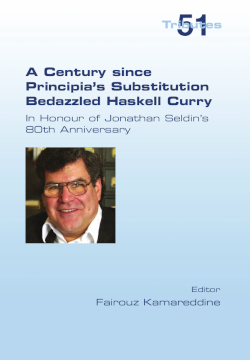 | A Century since Principia's Substitution Bedazzled Haskell Curry
In Honour of Jonathan Seldin's 80th Anniversary
Fairouz Kamareddine, ed
In 1922, Curry started reading Principia Mathematica and was intrigued by the complications of its substitution rule. As a result of trying to analyze substitution, Curry conceived the combinators in 1926. This collection is dedicated to Jonathan Seldin’s 80th anniversary. Seldin is the penultimate PhD student of Curry and the guardian of Curry’s paradigm.
The search at the beginning of the 20th century for powerful systems that combine computations and deductions (functions and logic) and that are able to formalise mathematics has led to the birth of the mighty λ-calculus of Church, Combinatory Logic of Curry and Category Theory of Eilenberg and Mac Lane, all of which are well represented in this collection. The struggle for internalising as much as possible while keeping the system consistent is clear in the evolution of the λ-calculus and combinatory logic and can be felt again in the articles in this volume. Similarly, the struggle for elegant theories that minimise the number of basic concepts while remaining as close as possible to the language’s structure is clear. Generalising concepts, connecting areas that may seem far apart and applying useful techniques from one area to the other is also represented well in this volume where for example notions like coherence, confluence, commuting diagrams, are extended between λ-calculus, rewriting systems and category theory, and where embedding relations are given to allow a lot of disciplines from logic to mathematics to computer science to meet.
See inside
11 July 2023
978-1-84890-436-1
Buy from Amazon: UK US
|

